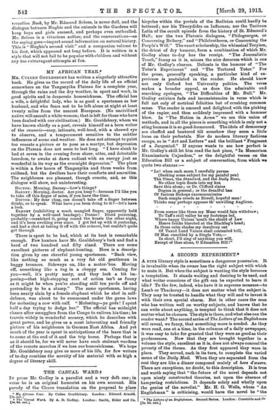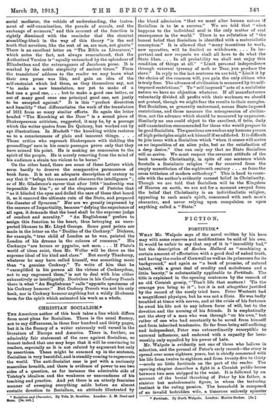A SECOND EXPERIMENT.*
A FINE literary style is sometimes a dangerous possession. It is invaluable when its owner has the right subject with which to mate it. But when the subject is wanting the style becomes a temptation. It stands waiting and desiring to be used, and what writer conscious of the gift can be expected to leave it idle ? To the few, indeed, who have it in supreme measure—to Lamb or Thackeray—it does not matter what the subject is. They may be trusted to handle what they will and to invest it with their own special charm. But in other cases the man who has written well on worthy subjects, and knows that he can write about anything, is tempted to think that it does not matter what he chooses. The style is there, and what else can the reader want ? The second series of The Letters of an Englishman will reveal, we fancy, that something more is needed. As they were read, one at a time, in the columns of a daily newspaper, it was easy to take for granted that they were as good as their predecessors. Now that they are brought together in a volume the style, excellent as it is, does not always conceal the poverty of the theme. As they first appeared they were in place. They served, each in its turn, to complete the varied menu of the Daily Mail. When they are separated from the rest they are like a dinner composed mainly of hors d'eeuvre. There are exceptions, no doubt, to this description. It is true and worth saying that "the future of the novel depends not upon nicely constructed theories, not upon the absence of hampering restrictions. It depends solely and wholly upon the genius of the novelist." Mr. H. G. Wells, whom "An Englishman" is criticising, would have the novel be "the • The Letters of an Englishman. Second Series. London : Constable and C. [3s. 6d. net.] social mediator, the vehicle of understanding, the instru- ment of self-examination, the parade of morals, and the exchange of manners," and this account of the function is rightly dismissed with the reminder that the stoutest stumbling-block in the way of this theory "is the sad truth that novelists, like the rest of us, are men, not giants." There is an excellent letter on "The Bible as Literature," which notes the fact, not always remembered, that the Authorized Version is " equally untouched by the splendour of Elizabethan and the extravagance of Jacobean prose. It is marked by the noble simplicity of ancient times." From the translators' address to the reader we may learn what their own prose was like, and gain an idea of the self-restraint which led them, as they themselves say, not "to make a new translation, nor yet to make of a bad one a good one, . . . but to make a good one better, or out of many good ones one principal good one, not justly to be excepted against." It is this "perfect discretion and humility" that differentiates the work of the translators of 1611 from so many similar efforts. So again the letter headed "The Knocking at the Door" is a sound piece of Shakespearean criticism, suggested, it may be, by a passage which the writer quotes from De Quincey, but worked out by apt illustrations. In Macbeth "the knocking within restores us to a consciousness of plain and innocent things. . . . Those critics who reproach Shakespeare with tickling the groundlings' ears in his comic passages prove only that they have missed his point. He is making no concession to the spirit of the people. He is merely removing from the mind of his audience a strain too violent to be borne."
On the other hand, there are some of these Letters which seem hardly to deserve the comparative permanence of book form. It is not an adequate description of oratory to say that it "befogs the reason and obscures the intelligence " ; or of Mr. Gladstone's career that after 1864 "leadership was impossible for him "; or of the eloquence of Pericles that "as it blinded the eyes and dulled the ears of those that heard it, so it ensured the ultimate ruin of the State, and prepared the disaster of Syracuse." Nor are we greatly impressed by the censure of Impartiality, because" defying the experience of all ages, it demands that the head shall be the supreme judge of conduct and morality." "An Englishman" prefers to assign this function to the heart, thus betraying an unex- pected likeness to Mr. Lloyd George. Some good points are made in the letter on the "Decline of the Cockney." Dickens, for example, "true child of London as he was, painted the London of his dreams in the colours of romance." His Cockneys "are heroes or pygmies, not men. . . . If Plato's world of ideas exist, then Mr. Weller will be there as the supreme ideal of his kind and. class." But surely Thackeray, whatever he may have called himself, was something more than "a genuine Cockney." To write of him that he "exemplified in his person all the virtues of Cockneydom, not to say engrossed them," is not to deal with him either exhaustively or intelligently. Doubtless in his Cockney Travels there is what "An Englishman" calls "apposite specimens of his Cockney humour." But Cockney Travels was not his only book, nor is Cockney humour anything but a wildly ill-chosen term for the spirit which animated his work as a whole.











































 Previous page
Previous page